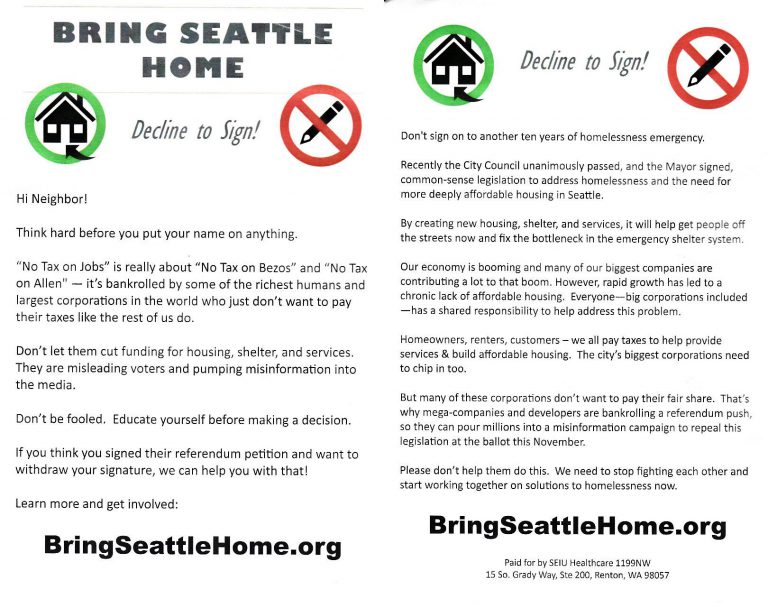Capital Flight On the Horizon for Washington State
If moving your primary residence out of state would save you hundreds of thousands of dollars every year (and your heirs or designated charities millions) would you do it?
That question is being asked in the state’s highest net worth households. But it’s a question that very few Washington Democrat legislators seem to be pondering, as they ratchet up progressive taxation at a pace never seen in state history.
I love Washington. Yet on a practical level, there is a nominal upper limit to how much in taxes is fair.
If you are in a high net-worth Washington State household, the math has reached a tipping point. For households worth at least $10 million, it works out that you could either commit several hundred thousand dollars to the State of Washington most years from 2025 onward, OR purchase (or even lease) a new home elsewhere with that money.
You could fully move and be done. Or you could establish residency in another state with a new primary residence (in short, live there six months plus one day, plus other requirements), enjoy fall and winter sunshine, live music or skiing in your new locale, then return to Seattle if you so desire for the sunniest, best summer months. You don’t need to say a total goodbye to the Pacific Northwest; you could just return as a visitor.
In so doing, you’d save hundreds of thousands of tax dollars each year.
Washington is also now the most expensive state in which to die a resident, with eye-popping 35% upper-end state estate taxes levied on the largest estates, and that’s before the feds take their share. The net total will be well over 50% of already-taxed household wealth going to government coffers upon death.
Is remaining a Washingtonian worth it?
There are great towns calling you. Austin, Las Vegas, Miami, Nashville, Lake Tahoe NV, Bozeman MT, Jackson Hole WY, Lake Winnepessauki NH, Sun Valley ID and more… There are lots of attractive choices.
Washington’s most radical Progressives prefer to frame their demands on your wallet as “Our-Taxes-are-just-a-Fraction of Your Net Worth,” especially when pushing (and nearly passing) a first-in-the-nation unrealized gain tax plan. They’d love for you to think of taxes this way — that is, how much of your own earned after-tax property you “get to keep.”
But framing taxes as a “mere” fraction of already-paid-for assets and earnings isn’t how most rational people think of their taxes when they’re writing checks every April, October and sometimes January to Olympia and King County.
No, most people think, “I pay $X,000 in taxes, both to contribute to the common good, and also for a set of things that I personally benefit from. It certainly shouldn’t be zero, and tens of thousands of dollars may indeed be reasonable each year for the most well-off. But what are the returns on that spending? Are my dollars being well spent? Are they put to good use? What are the outcomes, and why are so many flatlining or worsening the more we spend? And in addition to others’ needs, which I acknowledge, how well are you delivering the very basic things that I prioritize, like roads, schools with good academic outcomes, and a high-trust, safe, clean, livable state and city? Is WA a good state for builders and growth? As we spend more and more, am I seeing commensurate improvements in outcomes? Do I trust what you’re doing with the money I contribute each year?”
At some point, after years of failed promises and programs, compassion fatigue sets in.
Imagine you’re paying $250,000 in state and local taxes in a given year when, if you just happened to reside in another state with more sunshine for a little over half the year, you’d pay closer to $30,000. Would this affect your thinking? Would you begin to think about what you could do with an extra $220,000 each year?
The wealthy folks I know generally acknowledge, “Look, I’m very lucky. And I know I already pay far more into the system than I consume — that is, I’m extremely confident that I pay far more than the mythical ‘fair share’ I’m always reminded I need to pay. But… once a state government gets into demanding hundreds of thousands of my dollars per year, is there not some kind of upper limit to that generosity of spirit? Do I have other options? And by the way, is it even appreciated? What’s with the attitude that the wealthy and job creators are still somehow the enemy? Would I be more welcome, and would my tax contributions be put to better use… if I took them elsewhere?”
Sorry, Progressives. That’s a very rational line of thought when taxes get high enough. You’re not going to shame people into just going along, ponying up an uncapped amount of money, especially when the outcomes of your spending have been so poor. We’ve tried that, and you’ve failed to deliver the basic livability outcomes, yet you demand ever more. You continue the name-calling. You don’t seem the least bit interested in outcomes or transparency.
Atlas… is starting to shrug.
Seattleite Since Since ’91
This is the first time in my life that I’m seriously considering relocating out of Washington State.
For decades, Washington State was known as a relatively low tax, affordable place to live which welcomed builders, engineers and creative professionals.
I was lucky enough to join Microsoft more than thirty years ago, in 1991. I worked for there for several years, then left, built a business and sold it to Expedia, where I stayed for a couple more years. I’ve invested in startups, and created a couple of my own. I say this only to tell you that, judging from private conversations I’m having with friends from the high-growth 90’s and 00’s, and other anecdotal observations, we are in the midst of a significant capital flight of high net worth households from Washington State. The ramifications may not be seen for another few years, but it’s underway.
Many of the former colleagues I know are investors, builders or employers of some kind. While most loved Washington State, quite a few have gone from “Well, I could imagine moving residency if it gets really nuts” a few years ago to actually making plans. Some have already moved. Idaho, Montana, Nevada, Texas, Florida are all getting more investors, civic arts/theatre patrons and job-creators. And, well, taxpayers.
As it happens, I’ve just returned from Nevada, and totally see the appeal of relocating. I was on the phone yesterday with a real estate broker from Nevada, and he said, “You wouldn’t believe the number of inquiries I’ve had recently from Washington State.” No doubt the brokers of Florida, Texas and Idaho are experiencing the same.
The Graying of Microsoft and Amazon
When you’re taxing a specific demographic group particularly hard, it pays to know something about where they are in life and what options they have. What Washington State Progressives might not understand is that a great many of the estimated 4,500-5,500 such households they’re targeting to bear massive tax hikes are as mobile as it gets. They have options, they are at precisely the right “empty nest” stage that might normally trigger a relocation, and many (most?) won’t stay as the tax discrepancy rises.
Former Microsoft executive and venture investor Steven Sinofsky points out that a greater proportion of homes in the wealthy Seattle-area suburb of Medina are up for sale than even Silicon Valley’s Atherton neighborhood. Jeff Bezos just sold his home in Medina-adjacent Hunts Point a couple weeks ago. Geekwire and Bloomberg report that Las Vegas real estate brokers are making a special push to high net worth households in the Seattle area.
Ten years ago, the New York Times was already using the phrase “The Graying of Microsoft,” in reference to the average age of the company’s workforce. Microsoft grew rapidly in the 1980’s-2000, hiring generally young employees, awarding them equity packages that made tens of thousands of them WA millionaires. When I joined in 1991, the average age of Microsoft’s employee base was my age; 28. I’m now 60.
In the years that followed, Seattle then became headquarters to Earth’s Biggest Bookstore, Amazon.com, founded in 1994. And the pattern continued: tens of thousands of 20-something employees from the 90’s are now 50+.
Each of these companies, as well as Expedia, Google, Meta, Starbucks and more — have attracted and generated great wealth in a certain mobile, now 50yo+ demographic. The employees from the early days of Microsoft, Amazon and other Seattle-locating tech giants have seen kids through school and often college, and are mobile. They have options to reside anywhere.
In addition to life-stage, digital employees are among the most mobile of any type of worker. As we discovered during COVID, remote work can be done from anywhere.
Washington State lawmakers often state they are targeting “just” 4,800-5,500 households with massive capital gains and net worth taxes. But these 4,800-5,500 households are likely quite similar in their flexibility, stage of life, and mobility.
We’ve seen Jeff Bezos famously relocate to Florida. Even Bill Gates is likely to relocate, or shield his net worth in a series of trusts and LLC’s, if he hasn’t done so already.
Washington Wants More Billions… But Cannot Demonstrate ROI
This record-setting new cash grab might be palatable if the results were terrific. But they haven’t been. Public education — which is one of the State’s biggest uses of revenue — is a total disaster in Washington State, and there are no signs that the legislature or the dominant teachers union recognize the crisis. Seattle’s Public Schools have worse academic outcomes than they did ten years ago, and the district closed the schools to in-person longer than any other district in the world except San Francisco, which beat Seattle only by a couple weeks.
Despite squandering billions, Democrat Legislators in Olympia have queued up the largest tax increase proposals in the State’s history, above and beyond the acceleration seen in prior years.
It’s not like the state budget hasn’t kept up with population growth and inflation. Washington’s tax and fee revenues ballooned from $22 billion in 2017 to $35 billion by 2023. That $13 billion increase in 6 years is faster than population growth and inflation combined. With an over-reliance on federal COVID funds from 2020-2022, and with gross mismanagement (and payoffs to cozy political groups/causes), the State finds itself in a budget hole that some estimates place as high as $18 billion… from a surplus position just a few years ago.
Compare Washington State’s 2023 revenues to 2017:

Source: Washington State Department of Revenue

Washington State used to leave capital gains income untaxed. Now, it’s 7% on gains over $270,000, ratcheting up to 9.9% for gains over $1 million (if Governor Ferguson signs the measure that’s been passed.) This is on top of federal capital gains tax of 20% (long term) or ordinary income tax rates (30-36%) for those assets held less than one year.
Progressive activists shout “tax the rich.” Let me be clear: the rich are already taxed, quite heavily. Yet it doesn’t appear to be enough. What they mean, then, is “tax the rich even more.”
They’ve pushed an unrealized gains tax proposal — the first in the nation — which would tax unrealized gains (i.e., paper gains), yet not refund you anything if your portfolio experienced a loss. Nope, sorry. That’s not your property. (This unrealized capital gains tax scheme just barely failed to get through both houses this year, but it’s likely this proposal will stay alive for next budget session.)
At some point, high net worth families will say “No thanks, this isn’t your property. We have options, you’ve gone too far.”
I’m starting to seriously scout elsewhere. There’s no reason I need to be in Washington State — certainly not for the majority of the year — and it will save a ton of money over the next ten years if I change state residency. I’ll even enjoy a sunnier climate for the fall and winter months. And Seattle no longer has a monopoly on great coffee.
While I deeply love Seattle and the Pacific Northwest, at some point, the return on investment and the tolerance for ever more money (with little to nothing to show for it) just isn’t there. Looking at just the past two years as a snapshot, I’ve paid well into the six digits to state, city and county coffers. That’s not counting federal taxes. Is Seattle responding to the policies I’d like to see? It certainly didn’t from 2015-2022. It is now doing so, ever so slowly. Barely. But certainly not in public education, which remains a disaster and among the biggest of state spending items.
Why do I want hundreds of thousands more dollars to go to a system that seems intent upon squandering it?
At what point does the State owe every individual effective approaches in public education, basic road quality, liveability and public safety? If they’re going to get hundreds of thousands of dollars each year, they better be excellent at delivering the basics first. Olympia has failed at this, as have county and city executives.
Comparing Several States: WA, TX, FL, NH, NV
So where to? Let’s look at a few other states.
To change state residency, you need to live in another place more than 6 months of that year. But once you’ve changed residency, you could, for instance, still visit and stay in Washington State for June, July, August, September and October.
Below is a table outlining the individual tax ramifications for residency in Washington (WA), Nevada (NV), Texas (TX), Florida (FL), and New Hampshire (NH) as of 2025. I’ve got a few other places in my consideration set, but these are some good starting points. (TN, WY, MT and ID are also great options.)
The table focuses on key state-level taxes affecting individuals, including income tax, capital gains tax, sales tax, and property tax, as these are the primary taxes impacted by residency. Note that local taxes or other minor levies may apply but are not comprehensively covered here.
| State | Individual Income Tax | Capital Gains Tax | Sales Tax | Estate (Death) Tax | Property Tax | Notes |
|---|---|---|---|---|---|---|
| Washington (WA) | No state individual income tax on wages. | 7% tax on long-term capital gains over $270,000 (2024 threshold, subject to adjustment). Dems are proposing raising this to 9.9% for gains over $1 million. | State sales tax: 6.5%. Local Seattle taxes — about 10.35%. | 15%-35% on estates between $3m-9m, plateauing at a nation-leading, truly whopping 35% on anything over $9m, before federal estate taxes | Effective property tax rate: ~0.87%. | WA’s capital gains tax applies only to high earners with significant gains. Property taxes are moderate, but sales taxes can be high depending on locality. |
| Nevada (NV) | No state individual income tax. | No state capital gains tax. | State sales tax: 6.85%. Combined state and local average: ~8.24%. | 0% | Effective property tax rate: ~0.44%. | NV has one of the lowest property tax rates. Sales taxes are significant, and the state relies heavily on gaming and tourism revenue. |
| Texas (TX) | No state individual income tax. | No state capital gains tax. | State sales tax: 6.25%. Combined state and local average: ~8.19%. | 0% | Effective property tax rate: ~1.68%. | TX has high property taxes, which fund local services like schools. No income tax makes it attractive for high earners, but sales and property taxes can offset savings. |
| Florida (FL) | No state individual income tax. | No state capital gains tax. | State sales tax: 6%. Combined state and local average: ~7%. | 0% | Effective property tax rate: ~0.71%. | FL’s lack of income tax and moderate property taxes make it tax-friendly. Sales taxes are lower than in some other no-income-tax states. |
| New Hampshire (NH) | No state individual income tax on earned income. Interest and dividends tax repealed as of January 1, 2025. | No state capital gains tax. | No state or local sales tax. | 0% | Effective property tax rate: ~1.61%. | NH’s repeal of the interest and dividends tax makes it fully income-tax-free in 2025. High property taxes fund local services, and lack of sales tax is a significant benefit. |
Estate Taxes: It’s Very Expensive to Die in Washington State
As if taxes during one’s lifetime weren’t enough, Washington’s estate taxes are the highest of any state, tied with Hawaii.
Estate taxes are levied on the transfer of a deceased person’s estate, and the rules vary by state. Note that no state in this list imposes an inheritance tax, which is a separate tax paid by heirs.
But the estate tax means that more of one’s own accumulated wealth gets taken by the State at one’s death. When one dies, the gross estate is first established — that is, assets minus liabilities and deductions. Then, the gross estate is taxes by the State according to its rules. Then the federal estate tax kicks in, with a credit (which has a limit) for state-level estate taxes paid. All tolled, a high net worth individual can easily see half of the assets of an estate go to both the state and the federal government at death.
- Washington (WA):
Washington imposes a state estate tax on estates exceeding the exemption threshold. For deaths on or after January 1, 2014, the exemption is $2.193 million (adjusted annually for inflation, but not indexed for 2019). The tax rates are progressive, ranging from 10% to 20%, with the top rate of 20% applying to estates valued above $9 million, one of the highest top rates in the U.S. For example, an estate worth $10 million would face significant tax liability after the exemption. Washington allows a separate state Qualified Terminable Interest Property (QTIP) election and a deduction for certain family-owned businesses up to $2.5 million. Washington Democrats just passed a bill that, at this writing, moves the estate tax even higher — up to 35% marginal rate once an estate crosses $10 million. - New Hampshire (NH):
New Hampshire does not impose an estate tax or an inheritance tax. This makes it one of the states with no state-level “death taxes,” meaning heirs only need to consider the federal estate tax (which applies to estates over $13.99 million in 2025). - Nevada (NV):
Nevada does not levy an estate tax or an inheritance tax. Like New Hampshire, it has no state-level taxes on estates, so only the federal estate tax applies for very large estates. Nevada’s lack of estate taxes, combined with low property taxes, makes it attractive for tax planning. - Florida (FL):
Florida does not have an estate tax or an inheritance tax. The state constitution prohibits estate taxes, ensuring no state-level taxation on estates. Only the federal estate tax applies for estates exceeding the federal exemption ($13.99 million in 2025). - Texas (TX):
Texas does not impose an estate tax or an inheritance tax. The state repealed its estate tax effective September 15, 2015, which was previously tied to the federal state death tax credit. Currently, only the federal estate tax applies for estates above the federal threshold.
Key Observations:
- Income Tax: All five states have no individual income tax on earned income, making them attractive for residents seeking to minimize state tax burdens. NH’s repeal of its interest and dividends tax in 2025 aligns it with the others, while WA’s capital gains tax is a unique exception targeting high earners.
- Capital Gains Tax: Only WA imposes a state-level capital gains tax, which applies to long-term gains above a high threshold, affecting a small subset of residents.
- Sales Tax: NH stands out with no sales tax, providing significant savings on consumption. WA, NV, TX, and FL have relatively high sales taxes, especially when local rates are included, which can offset the lack of income tax for residents with high consumption.
- Property Tax: NV and FL have notably low property tax rates, while TX and NH have high rates, which can be a significant cost for homeowners. WA’s property tax is moderate.
- Overall Tax Burden: While these states are often considered “tax-friendly” due to no income tax, residents should consider sales and property taxes, which can be substantial. For example, TX’s high property taxes and WA’s capital gains tax may reduce overall tax advantages for some.
Residency Considerations
Thinking of moving? Here are some factors to consider:
- Establishing Residency: To benefit from a state’s tax structure, you must establish domicile (permanent home) and typically spend at least half the year there. States may scrutinize ties like voter registration, driver’s licenses, or property ownership to determine residency.
- Double Taxation Risk: If you maintain ties to multiple states (e.g., work in one state, live in another), you may need to file nonresident returns in states where income is earned. Reciprocity agreements or credits for taxes paid to other states can mitigate double taxation.
Limitations:
- Local Taxes: The table focuses on state-level taxes. Local taxes (e.g., city or county sales/property taxes) vary and can impact the total tax burden.
- 2025 Updates: Tax laws may change annually. The information reflects the most recent data, but minor adjustments (e.g., sales tax rates, capital gains thresholds) may occur.
- Other Taxes: Estate taxes, business taxes, or niche levies (e.g., WA’s potential wealth tax proposals) are not covered but could affect high-net-worth individuals.
Disclaimer
Every financial situation is different. Do not rely upon my table above; it may be out of date by the time you read this. For personalized advice, consult a tax professional, especially if you’re moving between states or have complex income sources.
Conclusion
Progressives are likely to cheer the wealthiest households picking up stakes and moving elsewhere. I can hear the “Don’t let the door…” comments already. But as this happens, the insatiable need for state revenue means that more and more of this tax burden will be borne by those with lower incomes. Washington State’s budget has outstripped the pace of both population growth and inflation, and there isn’t a serious effort to trim it back to 2010 inflation and population adjusted levels.
Progressives have a fairly static model of their taxation target. I think they’re underestimating the natural response. We’ll have to see how this plays out over the coming years.
Back to Zillow.







You must be logged in to post a comment.